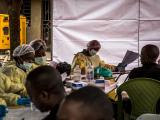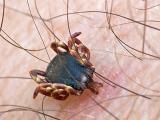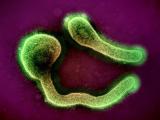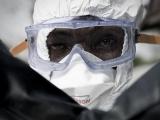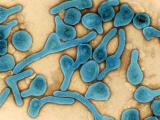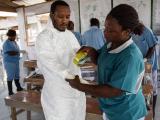Following a visit by top World Health Organization (WHO) officials to the latest outbreak of Ebola in the Democratic Republic of Congo (DRC), the WHO yesterday called for free and secure access for responders working in the affected conflict-affected area.
Over the past few days the DRC's health ministry confirmed 8 more cases, one of them a health worker from Mangina, the outbreak epicenter. According to an update yesterday, the outbreak total has risen to 52 cases, reflecting 25 confirmed and 27 probable cases. In addition, health officials are investigating 48 suspected infections. Two more deaths have been reported, lifting the fatality count to 39.
WHO mission highlights complex security issues
In a statement yesterday, the WHO said over a 2-day visit in the outbreak zone that was accompanied by the DRC health ministry, the group's leadership saw first-hand the complexities responders face in implementing Ebola activities in North Kivu province. They visited the city of Beni and the Mangina health area, the location of most confirmed cases reported so far.
A range of armed groups are active in the area, creating challenging security issued for health teams who need to go deep into communities to identify and monitor possible cases, the WHO said. Conflict settings can also discourage community members from coming forward for treatment.
The health ministry outbreak said in its response plan, posted by the WHO on Aug 10, that the far northern part of North Kivu province is relatively peaceful, but the situation near the outbreak area is unpredictable. The area dominated by armed conflict with a risk of deliberate attacks and acts of hostility against facilities, personnel, and property during times of tension. North Kivu—home to 8 million people—is one of the DRC's most densely populated provinces.
Tedros Adhanom Ghebreyesus, PhD, the WHO's director-general, said, "All of those participating in the response must be able to more freely and safety in conflict areas to do the work that is needed to bring the outbreak under control. The population must also have access to treatment centers that save lives and stop the spread of the disease."
Health worker exposures raise worries of worsening outbreak phase
Of the 8 latest confirmed cases reported since Aug 9 by the health ministry, 5 are from Mabalako, two are from Mangina, and 1 is from Beni.
One of the cases from Mangina reported yesterday is a health worker from the Mangina Reference Health Center, the health ministry said in its statement yesterday. About 74 of the health center's staff members have been identified as contacts of Ebola cases have been have been temporarily discharged and will be monitored for 21 days, the health ministry said in its Aug 11 statement.
As another response step, the ministry said it has finalized a plan through a World Bank-funded project to offer free healthcare in three health zones around the outbreak epicenter—Mabalako, Blessed, and Oicha—to remove financial barriers to care and encourage resident to seek care as soon as the first Ebola symptoms appear.
In Twitter posts today, Peter Salama, MD, the WHO's deputy director-general of emergency response, said sadly, many health workers in Mangina were exposed to Ebola early in the outbreak. And since health worker infections are known to amplify Ebola outbreaks, health officials expect the current DRC outbreak to get worse before it gets better. "Given complexities, we ask all partners to support government-led response with their most experienced staff," he said.
Salama said the event is on an "epidemiological precipice" and that there's a crucial time-limited window of opportunity to prevent the Ebola outbreak from taking hold in areas that are much more difficult to access due to security concerns. "There is not a minute to lose," he said.
Authorities to deploy experimental antibody treatment
Health officials are preparing to use an experimental antibody treatment called mAB114 in the latest outbreak Steve Ahuka, MD, PhD, a virologist from the DRC's National Institute for Biomedical Research (INRB) told Reuters on Aug 11.
The monoclonal antibody treatment was developed in the United States and is based on antibodies of a patient who survived Ebola during an outbreak in the DRC city of Kikwit in 1995, according to the Reuters report. Ahuka said the DRC's ethical committee has approved the use of mAB114 and that it could be used within days. He also said other experimental treatments could also be used.
mAb114 was one of five experimental treatments that the DRC health ministry ethics committee approved for compassionate use during the earlier outbreak, pending finalized study protocol details. In May, a WHO expert group evaluated five therapies—including mAb114—that could be used in the earlier DRC outbreak. It said though early data on mAB114 look promising, more were needed before recommending it for compassionate use.
Remaining vaccine questions, immune response after natural infection
Key scientific questions remain in efforts to develop a safe and effective Ebola vaccine, according to scientists from the Partnership for Research on Ebola Vaccination (PREVAC) who wrote a perspective piece that appeared in the Aug 10 issue of The Lancet. The team is currently conducting a phase 2 trials in West Africa to evaluate three Ebola vaccination strategies in people age 1 year and older.
In reviewing the status of the wider research landscape, they said 36 trials of Ebola vaccine candidates have been completed and another 14 are active. Focusing on four vaccine candidates (Ad26-ZEBOV, MVA-BN-Filo, chAD3-EBOV, and GamEvac-Combi), they said more data are needed in pregnant women, children, and people with immune compromise, including those with HIV and the elderly. Also, they note that more research is needed on the durability and speed of immune responses prompted by the different vaccine approaches. The team also called for studies to identify correlated of protection and large-scale trials to fully gauge safety and efficacy of the experimental vaccines.
In other medical literature developments, tests on the blood of 15 Ebola survivors found that antibodies from some of them neutralized Ebola viruses from four different strains, as well as Marburg virus. Writing in the Journal of Infectious Diseases today, a team from the United States and the DRC they described the experiments they did on the blood of survivors of a 2014 the DRC. Three survivors had a strong response against four filovirus glycoproteins, including that of Marburg virus.
Though they said the mechanism of action of the response requires further study, the data suggest that a pan-filovirus vaccine might be achievable and that it might be possible to isolate human monoclonal antibodies that neutralized all filoviruses.
See also:
Aug 12 WHO statement
Aug 10 WHO outbreak response plan
Aug 12 DRC health ministry update
Aug 11 DRC health ministry update
Aug 10 DRC health ministry update
Peter Salama Twitter feed
Aug 11 Reuters story
Jun 6 CIDRAP News story "DRC probes 5 new possible Ebola cases; WHO details experimental drugs"
Aug 10 Lancet viewpoint
Aug 10 National Institutes of Health press release
Aug 13 J Infect Dis abstract


